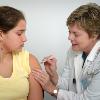
New Guidelines State Patients with Vaccine Allergy May be Safely Vaccinated
An apparent allergic reaction after an immunization should be investigated rather than avoiding future immunizations, which could leave patients at greater risk of disease, according to new medical guidelines published in the October issue of Annals of Allergy, Asthma & Immunology, the scientific journal of the American College of Allergy, Asthma and Immunology (ACAAI).
There are approximately 235 million doses of vaccines administered in the United States each year, and only 1 dose per million causes anaphylaxis, a serious medical reaction. Fatalities from vaccine-induced anaphylaxis are exceedingly rare.
"Local, injection site reactions and constitutional symptoms, especially fever, are common after vaccinations and do not contraindicate future doses," said John M. Kelso, M.D., Division of Allergy, Asthma & Immunology at Scripps Clinic in San Diego, and a chief editor of the practice parameter.
Kelso and colleagues recommend that all serious events occurring after vaccine administration should be reported to the Vaccine Adverse Event Reporting System (VAERS) at www.vaers.hhs.gov established by the Center for Disease Control (CDC) and Food and Drug Administration (FDA). Possible associations of the reaction to the vaccine can then be evaluated for causation.
All suspected anaphylactic reactions to vaccines should be evaluated by an allergist to determine the culprit allergen. An allergist, an expert in the diagnosis and treatment allergies and asthma, can perform allergy testing to identify the specific substances that trigger allergic reactions and determine the most appropriate and effective treatment.
Allergic, or IgE-mediated reactions to vaccines are more often caused by vaccine components rather than the immunizing agent itself. Vaccine components that may cause allergic reactions include gelatin or egg protein, and rarely, yeast, latex (contained in vial stoppers or syringe plungers), neomycin, and thimerosal.
"Gelatin, which is added to many vaccines as a stabilizer, is either bovine or porcine, which are extensively cross-reactive. We recommend that a history of allergy to the ingestion of gelatin should be sought before administering a gelatin-containing vaccine," Kelso said.
"The MMR (measles and mumps vaccines) and one type of rabies vaccine contain negligible or no egg protein, and can be administered to egg allergic children without prior skin testing. Egg protein is present in higher amounts in yellow fever and influenza vaccines and may cause reactions in egg-allergic patients, who should be evaluated by an allergist prior to receiving these vaccines," ," he said.
If the vaccine is warranted for an allergic individual, evaluation may determine that it can be administered in the office of an allergy specialist who is prepared to treat for an emergency if needed.
"Persons with a history of allergy to egg or a past reaction to an influenza vaccine may still be able to receive the H1N1 vaccine or the seasonal flu vaccine safely. I believe that anyone with this concern should check with their doctor and consult with an allergist," said James T. Li, M.D., professor of medicine and chair, Division of Allergy and Immunology at Mayo Clinic, Rochester, Minn., and a chief editor of the practice parameter.
The practice parameter, titled "Adverse Reactions to Vaccines," was developed by the Joint Task Force on Practice parameters, representing the American College of Allergy, Asthma and Immunology (ACAAI), the American Academy of Allergy, Asthma and Immunology (AAAAI) and the Joint Council of Allergy, Asthma and Immunology. The Joint Task Force practice parameters are online at www.allergyparameters.org.